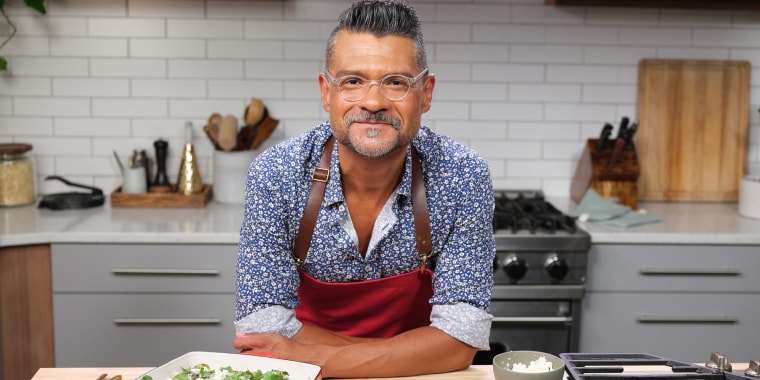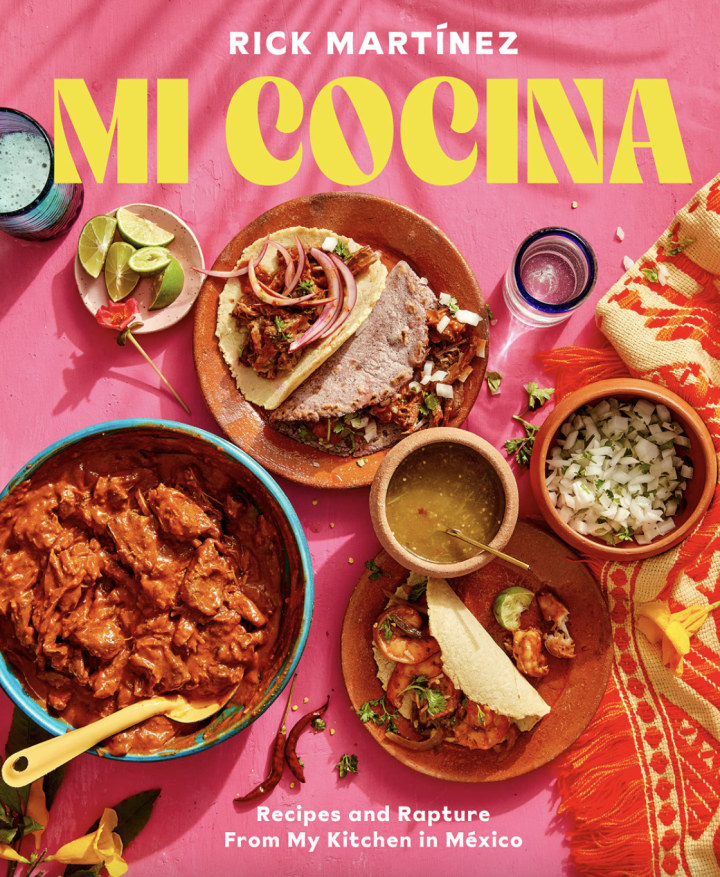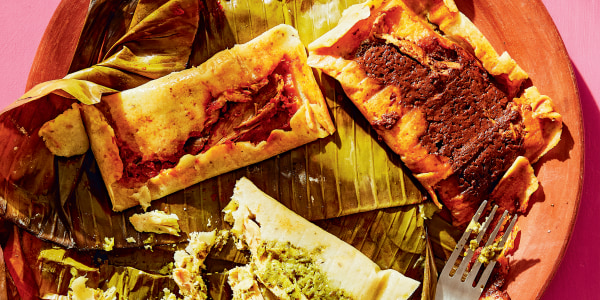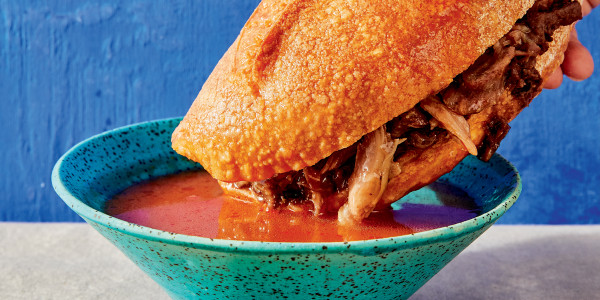As a Mexican American chef with his debut cookbook "Mi Cocina" coming out May 3, Rick Martínez knew that discussion around a certain holiday would be inevitable during his book launch in the U.S.
"The question that was posed by the publisher was, 'Do you want to acknowledge Cinco de Mayo or use this date in any way?'" he told TODAY Food. "And to me, there’s no sense in denying its existence as an American celebration. I’ve spent a lot of my life celebrating it here and I don’t have any problem with it at all. But imagine if you found out Finland was having parties on Pearl Harbor Day. It’s sort of weird, right? That to me is the equivalent. This day is about a battle that occurred in Puebla. It’s not Independence Day. Yet here in the United States, it’s a thing.
"So, I think we should raise awareness of Mexican and Latinx culture, beyond your typical margaritas and tacos. I’m using dishes from the book to celebrate the food beyond what people would normally be eating on Cinco de Mayo."
"Mi Cocina: Recipes and Rapture from My Kitchen in Mexico," by Rick Martínez
'Where do I fit in now?'
Martínez, who was born in Texas, is a third-generation Mexican American. He said that as a "brown kid," he was "called Mexican" even though he had never visited farther than the border towns. "In school, it’s not like we were taught Mexican history," he said. "The history that was taught to us in Texas was, like, the Alamo. And other than that, it was Cinco de Mayo and Tex-Mex food. That was what we were and my sum understanding of what Mexico was."
Martínez's parents, for their part, were busy trying to blend in in Texas. "My mom explored quintessentially American foods," he said. "She got married in ‘63 and she bought the Betty Crocker cookbook. That was her way not only to expand her culinary repertoire, but also be more American. We ate things like salmon croquettes and chicken-fried steak. My parents tried so hard to acclimate into American society and Texas culture that you kind of let go of the past to try and fit in. So, for me, the question was: Where do I fit in now? I am American, but I had this past that I couldn’t deny, that I wanted to understand more about."
'They don’t look like me, I don’t look like them, so why do they get to be the voice of authority on Mexican culture?'
It didn’t help that as a teenager in the late '80s and '90s, Martínez said all the Mexican food he saw on TV was made by white people. "I’d watch the cooking shows with Diana Kennedy and Rick Bayless, and that was my only other connection to Mexican cooking. And I’m watching this British woman who lives in Michoacán who goes to these beautiful markets and prepares food … and then I see this white man from Oklahoma travel the country and present his favorite dishes in Mexico. And I don’t understand, as a brown Mexican American boy, why they get to represent my culture and my cuisine. And I respected what they do, and I was like a little sponge soaking it all up, but they don’t look like me, I don’t look like them, so why do they get to be the voice of authority on Mexican culture?
"Even to this day, when Diana Kennedy's documentary came out, she's still — still! — the voice of, and the authority, the queen of Mexican food, when there are so many incredibly talented Mexican/American/immigrant chefs in both countries that know so much more about the culture," he said. "I don’t discount any of the work that she’s done, but it makes me very angry that we’re not celebrating the Mexican immigrants or Mexican Americans doing so many revolutionary culinary projects in both countries that know so much more. So I looked at them, and at that moment, as 16-year-old Rick, I decided I would be that one day."
'Probably the biggest thing (my mom) taught me was cooking out of love to show your appreciation for someone.'
As a young adult, Martínez was talked out of going to culinary school by his parents, who said he needed to get a "real" degree. "They didn’t want me to get stuck in restaurants. It’s a hard business. So I went this other route. I worked in advertising and marketing." During that time, he found fulfillment cooking for friends, and a desire to make people happy through food that had been passed down from his mother.
"Probably the biggest thing that she taught me was cooking out of love to show your appreciation for someone," said Martínez. And eventually he found his way back to food at Bon Appetit magazine, where his following grew. "I discovered that presenting these recipes to people and having them cook and then tag you in it, and tell you how much they loved it, was so incredibly gratifying. That is 100% the reason why I do this. It fills you up with happiness to know that something that you made is being shared like that."
Thus began a lifelong journey that would take him through Mexico, into the "predominantly white" world of food media in New York, and back again. "The first time I traveled into central Mexico, it just blew everything I knew about Mexico out of the water. I asked, 'Why did we have this label? Why did we accept this label, as Mexican Americans, if it is so different from what we were?' The reality is, as third generation Mexican Americans, we were so far removed (from our roots there). I love Tex-Mex, I think it is a cuisine that deserves a lot of attention, but it is Texan — it’s not Mexican."
Now, Martínez is on a mission to open up our understanding of what Mexican food is 'beyond your typical margaritas and tacos.'
In March of 2020, Martínez was traveling through northern Mexico on a "very personal" research project rediscovering his heritage through food. Then the pandemic struck and changed his circumstances instantly. He spoke fondly of an Airbnb host who left him fresh fruit every morning despite the fact that they were "too scared" about COVID-19 to come into contact. He’d repay her kindness by preparing extra food for her and leaving it out at night. "To be able to correspond via food … that sustained me through lockdown. We never really even saw each other. Our food exchange was our only contact."
As pandemic restrictions lifted, Martínez spent 586 days traveling through the different regions of Mexico, ultimately buying a house in Mazatlán so he could truly call the country home. A devoted following on social media watched his every move — a responsibility Martínez does not take lightly.
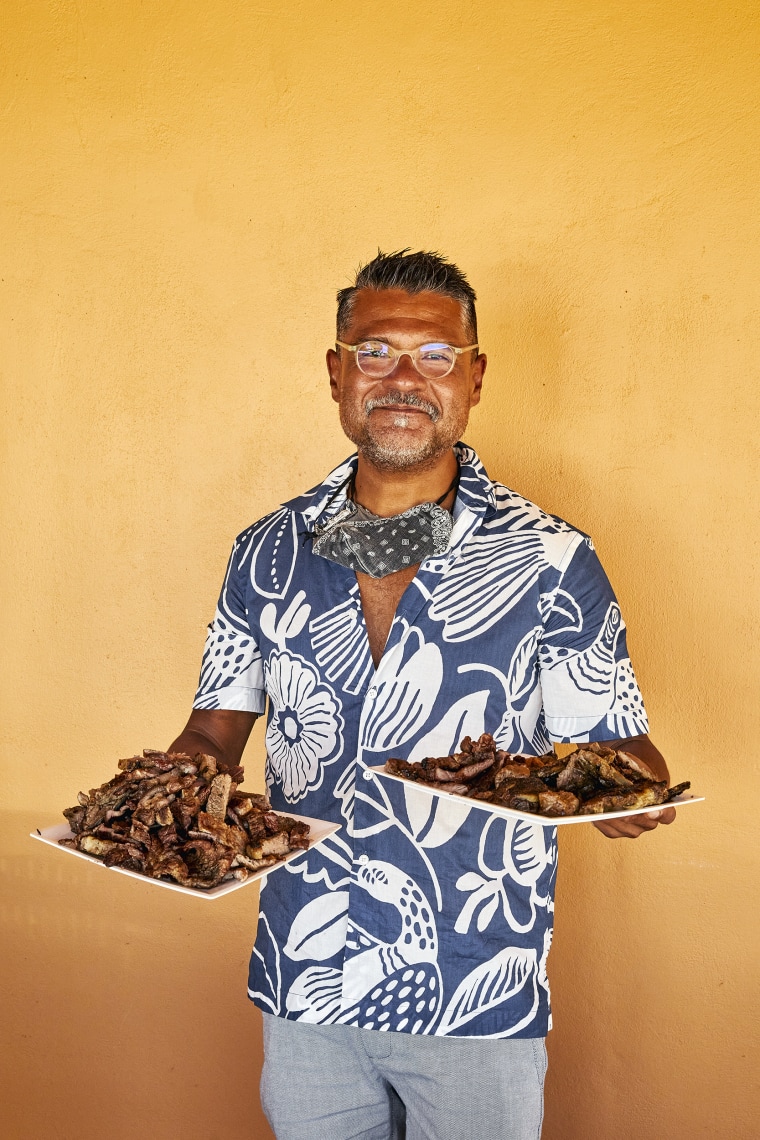
"I want people to fall in love with this country in the way that I have. When I first started traveling around Mexico, a gentleman reached out to me on Instagram and he told me his only understanding of Mexico was what was in the media," said Martínez. "Trump was the president at the time, so what you heard about was border crossings and kids in cages, and he was fearful. He had a lot of very negative perceptions of the people and the country. I don’t know why he followed me, to be honest, but he said, ‘I want you to know that my wife and I are now planning to take a trip to Mexico. We’re not going to a touristy area, we want to go to one of the places you presented in your stories. And I want to thank you for opening me up to this whole new world that I thought I knew but I didn’t know.'"
'It’s unfair that such a beautifully talented, diverse, educated, hardworking people get such negative publicity in the United States.'
Martínez’s hope for "Mi Cocina" is about that understanding even more so than it is about the recipes. "I want you to cook my food, but if you didn’t cook the food, if this is what you took away from it, that is all that I could ever hope for," he said. "Just changing one person’s mind about the people. Because it’s unfair that such a beautifully talented, diverse, educated, hardworking people get such negative publicity in the United States.
"What I want for people is to change perceptions of the country, and I want you to cook food that you have never heard of before … I tried to make these recipes really easy for a home cook in the United States. Ingredients that are available at your local grocery store, no special equipment, and that’s all you need."
Martínez is still coming up against misconceptions about Mexican culture and cuisine.
"The biggest (misconception) is this belief that the cuisine is heavy or unhealthy, fatty … and to be fair, I love lard, I love pork. But I think people are not aware of, and what I wanted to do with this book is show, the diversity of the cuisine. There are so many geographies, the country is huge. Like America has pizza, hot dogs and hamburgers, but that’s not the extent of it, right? All the things that Americans think of being very Mexican were probably brought over by the Spanish: dairy, bread, cows, wheat … these did not exist in Mexican culture, which was very plant-based before the European arrival. Like any cuisine, there are things that are very rich and delicious, but there are also things that are healthy and beautiful and very different than most Americans think of."
In the pages of "Mi Cocina," readers will find a labor of love that Martínez said "had been sitting there," percolating inside him, "for a good 25 years." As a boy, he said, he’d wanted to be the "voice of authority" like those white Food Network stars he’d seen on television. "Now I’m like, I don’t need that, I don’t want that. I wanted to understand Mexico for myself."
